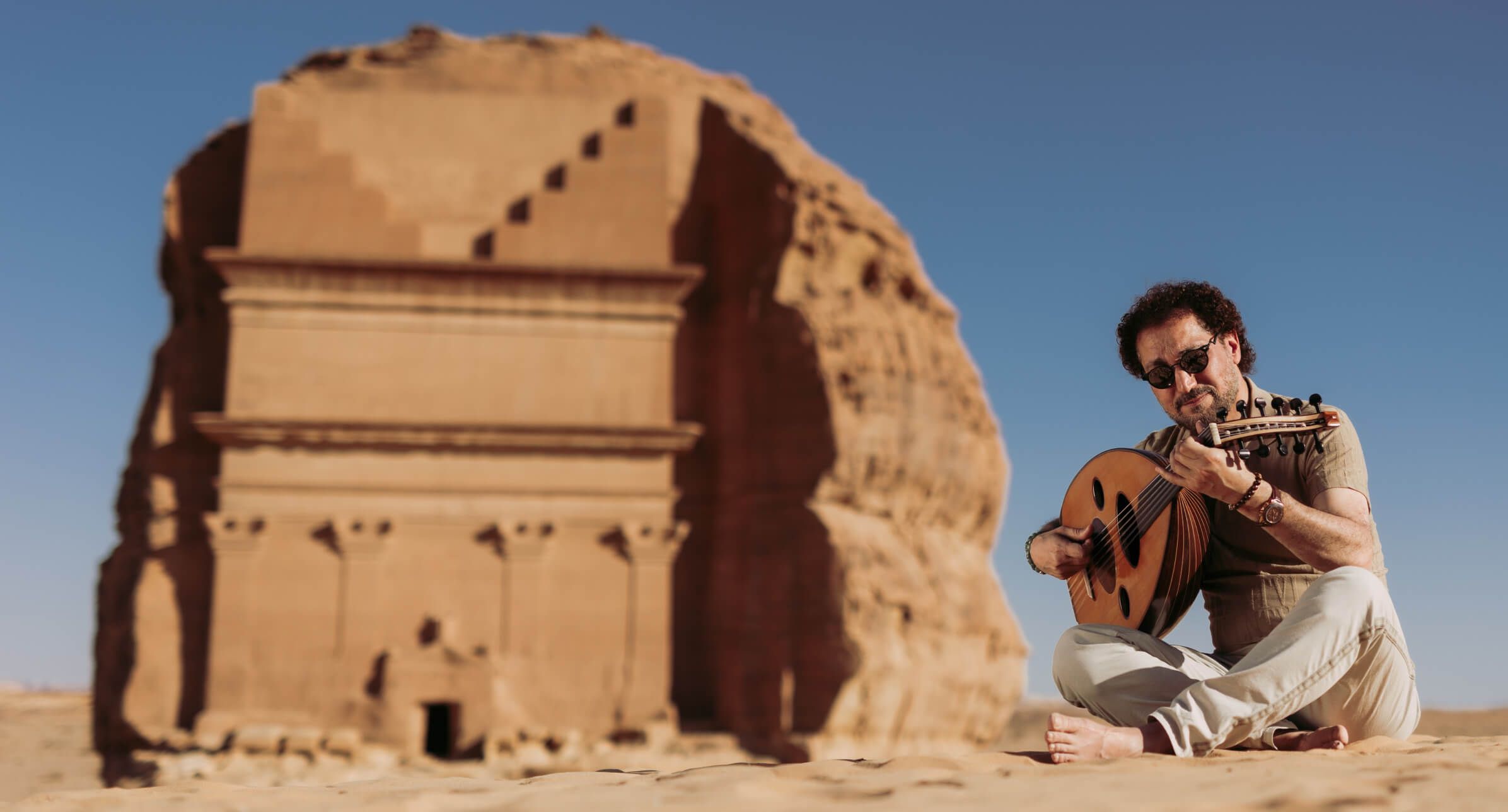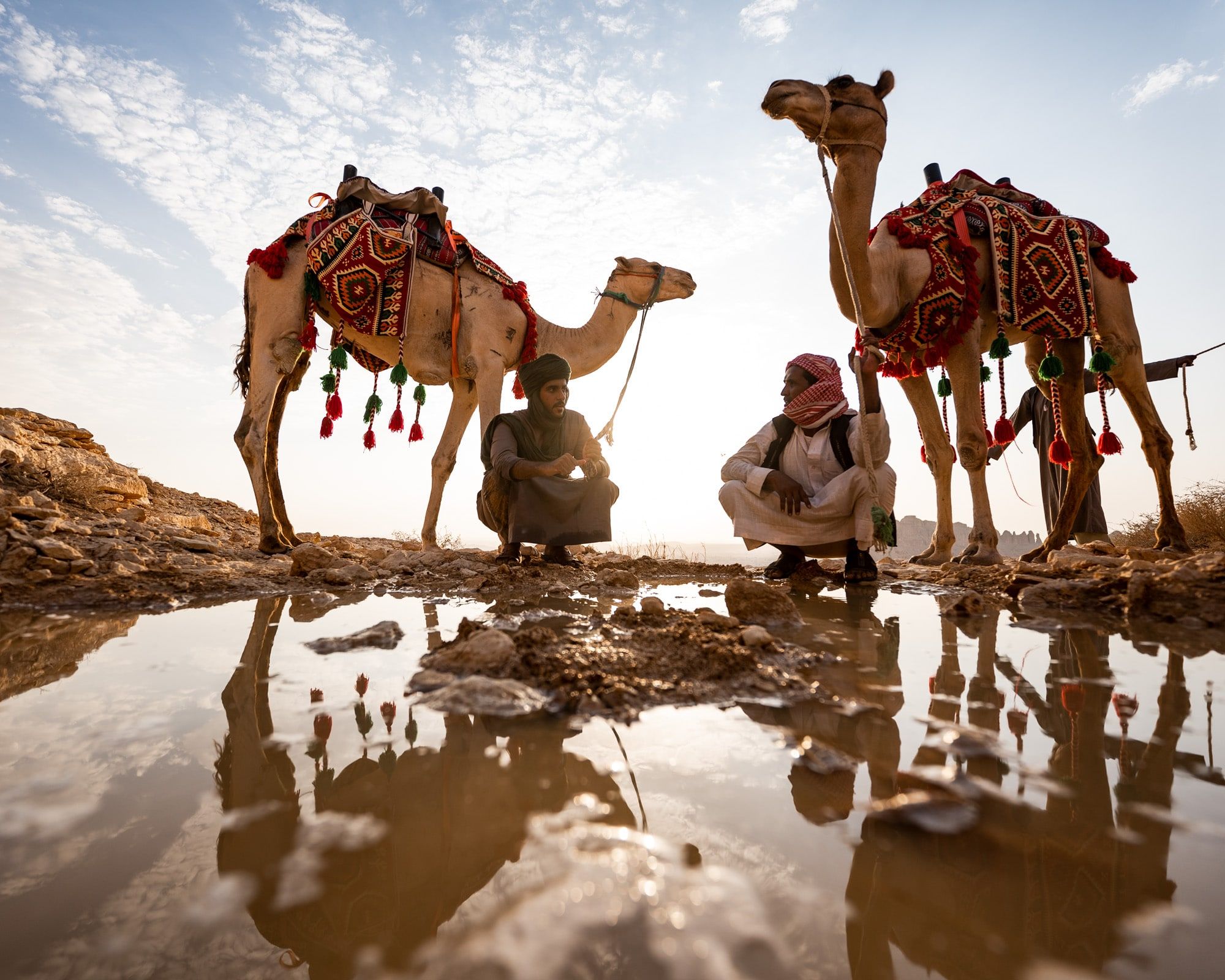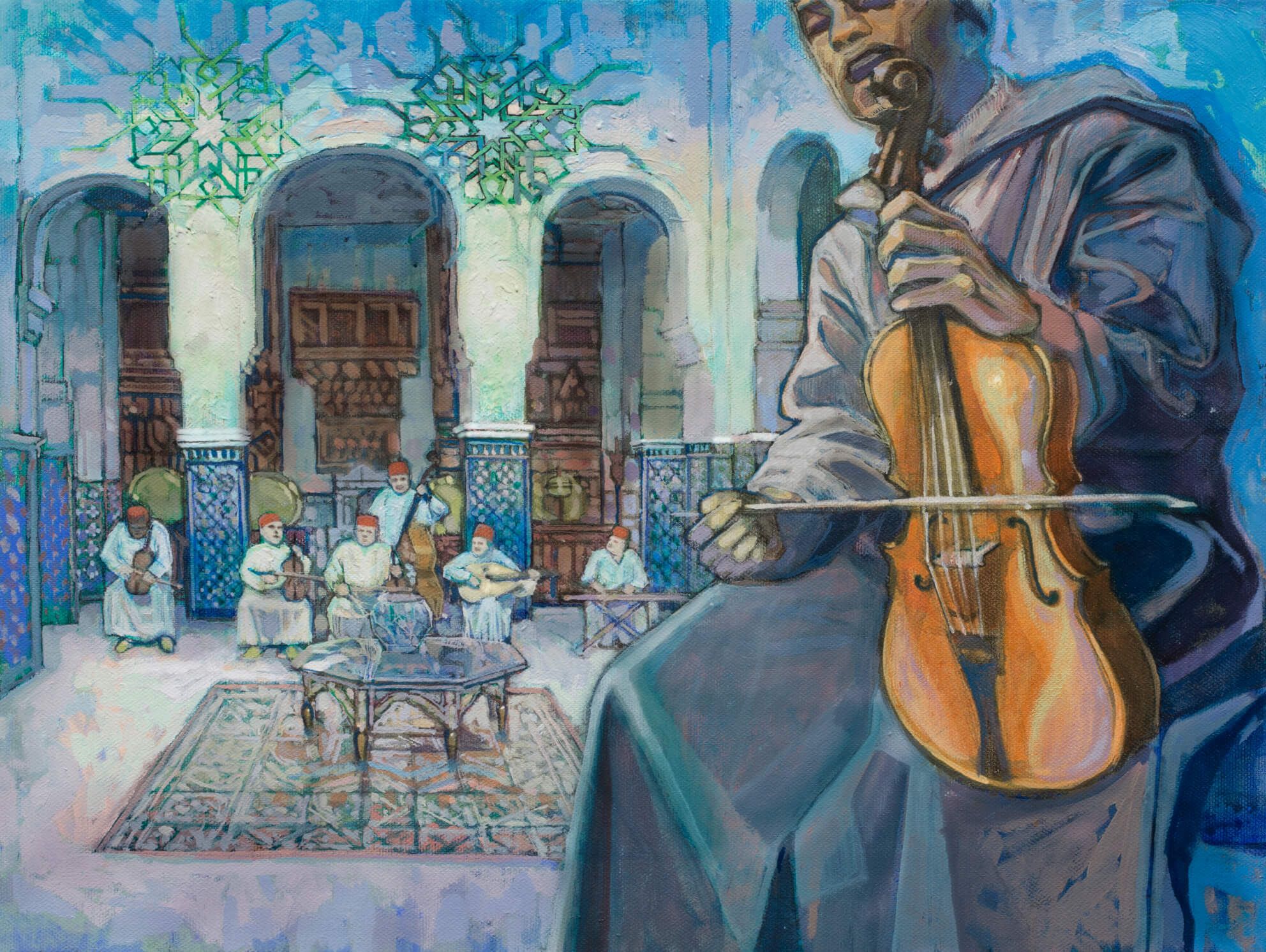King of the Instrument of Kings
Naseer Shamma, the musician and legend. courtesy of the artist.
Naseer Shamma, musician.
Composer, oud master, innovator, humanitarian, intellectual, educator? As much as I would like to start with Naseer Shamma, the celebrated musician, I’m going to have to start with Naseer Shamma, the gentleman and humanitarian. Not only did he take time out of his busy schedule while on tour in the US to talk to Ithraeyat, but his first question to me after I announced I was ready for this interview on February 6 was whether I and anyone close to me was affected by the earthquake.
The oud and Naseer Shamma are pretty much synonymous. You won't find any piece written about the king of instruments (oud) without mention of its modern-day master. Shamma is widely considered the greatest oud player of the modern era, and perhaps the most gifted of all time.
I first saw him play live at the Doha Museum of Islamic Art opening in 2008. The performance was nothing short of mesmerizing and transcendental. It felt like it was just him and me there - all else vanished into the ether. I still recall how his music moved me in ways I'd never before or since experienced. He performed رقصة الفرس (The Dance of the Horse), a song he composed when he saw a wild horse and considered it to be the happiest and freest being on Earth. You can feel the horse's pounding hooves on the ground, and the carefree movements, and its mane flying in the wind. The piece emphasizes power, beauty and speed. There is soul and technique and creativity.
The oud, an ancient Middle Eastern instrument and one of the oldest stringed instruments, is thought to have originated in the Akkadian civilisation of 2350 BCE and flourished during the old Babylonian era (1950-1530 BCE). It is described by Arabs of old as an instrument that “the strings of which once moved, creates a melody that at times lulls one to sleep, and others causes one to weep.” Poets and philosophers alike were entranced by the melodic wooden box. Throughout time, the oud went through changes in its shape and strings before becoming the eleven-stringed instrument of today. Still, it hasn't lost its charm and is now a major part of Arabic music.
What most people may not know is that Shamma was at one time sentenced to death by hanging and was almost executed by Saddam’s regime.
He was targeted as an Iraqi dissident and was arrested after a concert in Jordan. Upon arriving in Baghdad, he was interrogated for twenty three days. He was then sentenced to death by hanging for his supposed criticism of Saddam Hussein's regime. “I know lots of people love him but he was harsh with his own people. We were four hundred inmates in jail - only two survived. None of us had committed any crime. That ordeal made me grow up very quickly.”
He was barely twenty years old. Every morning for one hundred and seventy days, they awaited news of their execution. When the guard called out names such as Ahmed, several Ahmeds would faint. They didn't know whose turn was next. He was saved when an Egyptian actor, Noor Al Sharif, who saw him play in Basra, mentioned his name to a Baathist general who requested his file and freed him.

Naseer Shamma, the musician and legend in AlUla, Saudi Arabia.
The day he was released from prison, his sister was killed in an apparent car accident. She was nine months pregnant. Shamma believes she was killed as an act of retribution by the regime. “We’re a very tight-knit family. That same day I was sent to Mosul for military service. I cried all the way there for my family's loss. My only consolation was my oud.”
His sister’s name was Nidhal, meaning resistance. He wrote a piece of music in her honor on the fortieth day after her death called رحيل القمر (The Departure of the Moon). To me it's a playful conversation with a baby, and a sad discourse with her mother.
“Prison and war changed the course of my life, especially the bombing of Iraq in 1991 and 1993. The way I played oud and struck the strings was different after that. If you listen to recordings before and after there is a stark contrast. In order to continue living my life after my ordeal, I had to forgive. I even forgave Saddam.
“My life was again in danger in 1993. I managed to leave and did not return to Iraq until the 2012 Arab summit, after the Americans had left. However, the most important years I lived in Iraq in spirit were the years my body left Iraq. I left in order to preserve my love and belonging to Iraq in a different way.
“When we don't live in our native country, we try to create an alternative homeland. I am very loyal to where I live and who I am with but I will always belong to Iraq.
“We furnish our homeland with our souls.”
In his youth, Naseer noticed how people would gather to listen to Umm Kulthum on the radio and how that sound, traveling from thousands of miles away, had such a profound effect on its listeners. How these normal housewives, after listening to Umm Kulthum and Abdul Wahab, would transform into beautiful women. “I saw a relationship between beauty and music. How can music have such an effect on people? That an ordinary housewife by day could turn into a stunning beauty by night.”
“I learned the importance of knowledge as a child. A group of intellectuals and thinkers who knew my family would gather weekly in a local barbershop to exchange ideas. I started to understand the importance of culture and learning in everything in life; how it impacts people, behavior, manners, art and relationships. It changed me completely.”
Shamma believes that you can’t separate learning from talent regardless of how big the talent is. There has to be a teacher and study is essential.
Also key are culture and intellect. “Without depth and intellect, he/she becomes just an instrumentalist; a technician and the music will end with the show.” A deeper musician would produce a more nuanced and complex art.
“The first music piece I ever played was القلب يعشق كل جميل (The Heart Loves Everything Beautiful), sung by Umm Kulthum. I didn't understand the words at the time yet I wept. Even as a child, I could feel its depth of meaning and that is a testament to the brilliance of the writing.”
Shamma likes to use a simple oud, without any embellishments. “I believe that any addition takes away from its sound. It's the perfect size for me and it’s been my companion since the age of eleven. Through happiness, sadness, anger, love, the whole gamut of life’s emotions and experiences, it was by my side.”
Still, it is just an instrument. To give it life requires a human touch. “Music is physics. Half of it is art, the other half is math.”
“Music makes everything more beautiful and more intense. The musician controls the musical narrative, giving the oud a voice of sadness or joy. I like to turn my fingers into a human voice box; to express music through my hands. It is the highest language; it doesn't need translation. It can be felt and understood by all.”
Shamma believes that music is essential to the human experience. “For as long as man has existed, he has created sound to express danger, alert others, and bring people together. Those simple designs would eventually become complex musical instruments. Every culture and civilization has its own music that reflects its environment, struggles, and joys. Art is a necessity; it can provide solutions to society’s problems and reduce violence, intolerance, and extremism. Art flourishes in an environment that is politically, economically, and socially secure. Our Arab world needs people who believe in culture as a means of expression."
“My relationship with music is like my relationship with life. It represents me and I represent it. The oud is my light. It’s certainly not my shadow - perhaps I'm its shadow. But like a shadow, it is part of me and I am part of it.”
Arab Oud House (or Bayt al Oud), is also synonymous with Shamma. The world’s best soloists and instrumentalists graduate from his schools which are popping up globally at a surprising rate.
Bait Al Oud was established in Cairo in 1999 as a professional music school specializing in the instruments and rhythms of the East. There are schools in Abu Dhabi, Alexandria, Baghdad and Khartoum. “We’re opening in Riyadh soon where we will be focusing on re-reading and applying ancient Arab musical texts. Other cities in the Kingdom, possibly Dammam and Jeddah are also on the horizon.”
A particularly symbolic opening will be in Mosul in March, which will coincide with the inauguration of the 12th-century Al-Nouri Mosque and the Al-Hadba minaret, destroyed by Da’esh in 2017.
“Education is give-and-take; everyone should grow and benefit from one another. It would be selfish to acquire knowledge and not share it.” Each of Shamma’s student takes an ethical pledge to teach at least ten students for free - what he likes to call زكاة العلم (zakat of knowledge).
“I turned my dreams into an army of students. One lifetime is not enough for everything I want to achieve. So I encourage each of my students to explore a path that aligns with one of my dreams. I have dreams of research, writing, publishing, manufacturing etc. Therefore, I plant my dreams into my students, support them, and watch my dreams multiply. Today I am reaping the benefits of that legacy.”
When asked about advice he’d give to the youth, he said, “be persistent - even if it takes years. If you continue, eventually you will succeed.”
Arguably, one of Shamma’s greatest feats has been the technique he designed for playing the oud with one arm. His friend whose arm was severed in the Iran-Iraq War said that the war had stolen his dreams of playing the oud, just like it did to so many others. At the time Shamma had a monthly concert in the Al Rasheed Theatre in Baghdad, which he canceled for three months to work on perfecting his technique. He came up with قصة حب شرقية - (An Oriental Love Story) where each hand is a lover and the oud is the medium through which the two communicate.
Another incredible technique he mastered was how to play the oud with just one finger, for his sister's husband who was left with only part of his hand, due to the ravages of war. Talking to him I noticed his work always has meaning and a higher purpose. He gave hope to those who had been crippled by war.
“A third of my life has been simply practice, perfecting new ways of thinking and playing, and I’m still learning and still practicing everyday. I believe my work is done when I have managed to introduce the oud to Europe. Everything we have in the Arab world is imported. But when we can export a key element of our culture, I will have succeeded.”
As we spoke, he was in the middle of a tour of the US with Wynton Marsalis, Artistic Director of Jazz at the Lincoln Centre in New York. His vision? “How to play oud with jazz without losing its style, identity, culture, heritage and sound. This was a dance between modernity and the classical with the aim of preserving our cultural identity.”
Shamma considers the oud to be the iconic instrument of the East. “It’s the identity of the orient. Its origin was in the Babylonian temples used for prayer and meditation by the kings of Mesopotamia before making important decisions. In the period of Harun Al-Rashid, famous Islamic scholars such as Al Kindi, Al-Farabi, Al Armani, Ibn Sina and Ibn Zaida all played the oud. It’s legacy is so powerful that it has greatly influenced other stringed instruments in the West.”
“Iraq had seven major civilizations. In all these civilizations, the oud was the prime instrument, along with the nay and daf. The oud has maintained its identity for 5,000 years, making it one of the oldest and most revered instruments today. It is the identity of the Land between the Tigris and the Euphrates, the Levant, the Nile Valley, the Arabian Peninsula and North Africa. It helps unite the Arab countries and spreads beauty to the rest of the world.”
However, despite all his wondrous achievements, Naseer considers his biggest achievement to be his daughter Layl.
“Professionally, the most important thing in my life is to achieve a style that is known from the first two or three strokes. The other thing is my daughter Layl. She is the pinnacle of my existence and my humanity. She is the fruit of the great love I have for my wife Lina Al Tibi, the creative poet and writer. Layl is the best thing in my life.”


